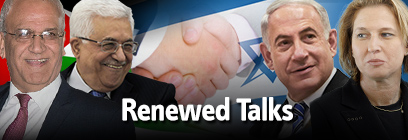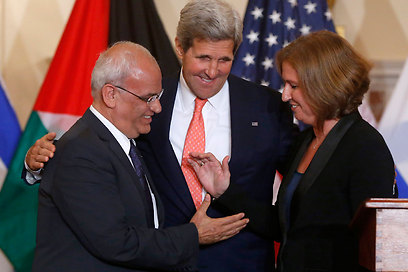
Livni: Talks can create alliance against regional threats
Chief Israeli negotiator expresses hope, but realizes process will be lengthy, difficult. 'We are not entering this process euphoric or with the expectation of a new Middle East,' she says. Settlers concerned renewed talks may lead to interim Palestinian state with temporary borders
Justice Minister Tzipi Livni told Ynet Tuesday: "We're making progress, and are working to end the conflict, discuss everything and everything is on the table."
"The choice each representative is about to make is between receiving applause from his or her audience… and entering a room with the intent of reaching a settlement. That's what I intend to do."
Related stories:
- Kerry: Time has come for lasting peace
- Talks resume, but Palestinian public still divided
- Obama meets Israeli, Palestinian negotiators
The justice minister added that the US has been exhibiting serious involvement. "I believe in a reciprocal negotiation between the two sides that need to make the decision, but the Americans' announcements that they would assist and choosing (US envoy Martin) Indyk who is considered an expert points to involvement."
Livni addressed the meeting with US President Barack Obama, saying that "some argued that this was a personal issue for the secretary of state and that the president was not backing it, so it was extremely important for President Obama to clarify that this is in the interest of the US and show his support."
She stressed: "We are not entering this process euphoric or with the expectation of a new Middle East – we see the changes in the region," she noted, adding that Hamas and Iran expressed their resistance after Kerry announced the resumption of the talks.
Furthermore, regarding regional developments, Livni noted "This process creates a partnership that is highly important to us so as to deal with the main threats. We have an opportunity to form an alliance against extremists' threats. The goal is to reach a settlement – not just hold negotiations. This could create many opportunities for us and for the US."
The Israeli negotiator stressed she was making the effort to "to represent Israel's security and diplomatic interests" through talks. She added she was not naïve about the results, but realized the need for diplomacy – "it's our national interest."
Israeli Right concerned
Officials in the Likud party and in the settlement movement are afraid that to prevent a crisis in the talks, Prime Minister Benjamin Netanyahu may be pressured to agree to such an interim agreement, even though Palestinians have so far rejected similar outlines.
Israeli Deputy Foreign Minister Zeev Elkin told Ynet on Tuesday night that "the Right is concerned with terrorists' release, with the yet unclear restrictions on settlement construction and with the possibility that the PM will cave in and agree to a Palestinian state based on the '67 lines.
"But the most fundamental fear is that eventually, over the course of the talks, an interim agreement will arise which will commit the Palestinians to nothing and prevent the peace process from crashing," Elkin added.

Erekat, Kerry, Livni (Photo: AFP)
Dani Dayan, formerly the Yesha council chairman, was also concerned with the interim state scenario, but said that for now, he chooses to "keep cool."
"Settlers are very concerned with the ongoing process, but I don't believe Abbas is able to sign a peace agreement. However, the Right and the settlements have an actual concern of the possibility of other outlines, including some sort of an interim agreement."
So far, officials in the Right have not voiced any intentions of undermining the government or bringing about Habayit Hayehudi's withdrawal from the coalition, though Naftali Bennett's party is trying to push forward the referendum bill and a declaration of continued settlement construction.
Officials close to the PM hinted that it is not unthinkable that Netanyahu will announce the construction of hundreds of housing units in the settlements. "When there'll be something to announce, the PM will announce it," said an associate of Netanyahu.
"Israel did not make any commitment not to build in the course of the talks preceding the negotiation's resumption," he added.
As talks develop, the negotiation teams are expected to expand. So far, Livni and Attorney Yitzhak Molcho, the PM's special emissary, are leading the Israeli team, but the IDF 's planning division, which took part in peace talks over the last 20 years, is expected to join in as well.
Also, the team will be attached with at least one international law specialist, as well as other specialists to deal with the borders and security issues.
The Palestinian team is led by chief negotiator Saeb Erekat and President Mahmoud Abbas' adviser, Mohammed Shtayyeh, both of whom have been major players in failed negotiations with the Israelis since 1991.
- Receive Ynetnews updates
directly to your desktop















